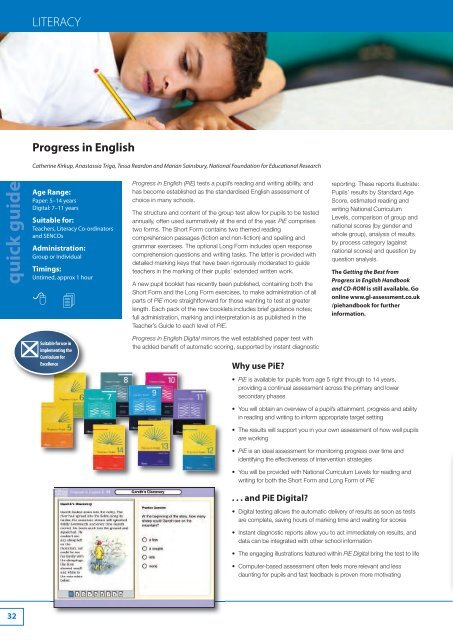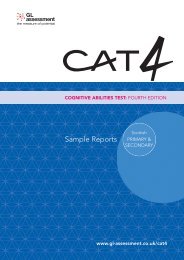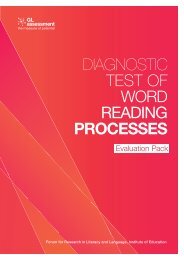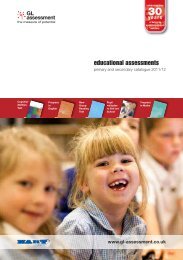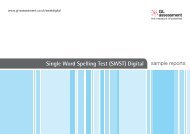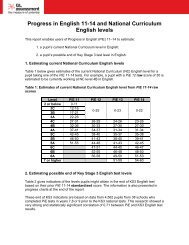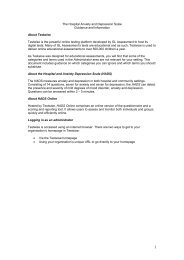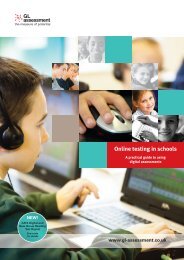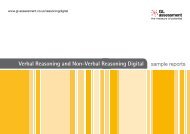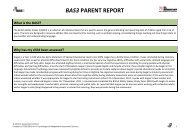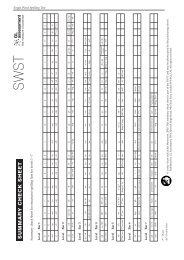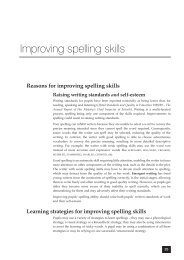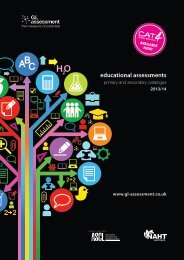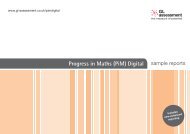educational assessments
quick guide - GL Assessment
quick guide - GL Assessment
- No tags were found...
Create successful ePaper yourself
Turn your PDF publications into a flip-book with our unique Google optimized e-Paper software.
LITERACY<br />
Progress in English<br />
Catherine Kirkup, Anastassia Triga, Tessa Reardon and Marian Sainsbury, National Foundation for Educational Research<br />
quick guide<br />
Age Range:<br />
Paper: 5–14 years<br />
Digital: 7–11 years<br />
Suitable for:<br />
Teachers, Literacy Co-ordinators<br />
and SENCOs<br />
Administration:<br />
Group or Individual<br />
Timings:<br />
Untimed, approx 1 hour<br />
<br />
<br />
Progress in English (PiE) tests a pupil’s reading and writing ability, and<br />
has become established as the standardised English assessment of<br />
choice in many schools.<br />
The structure and content of the group test allow for pupils to be tested<br />
annually, often used summatively at the end of the year. PiE comprises<br />
two forms. The Short Form contains two themed reading<br />
comprehension passages (fiction and non-fiction) and spelling and<br />
grammar exercises. The optional Long Form includes open response<br />
comprehension questions and writing tasks. The latter is provided with<br />
detailed marking keys that have been rigorously moderated to guide<br />
teachers in the marking of their pupils’ extended written work.<br />
A new pupil booklet has recently been published, containing both the<br />
Short Form and the Long Form exercises, to make administration of all<br />
parts of PiE more straightforward for those wanting to test at greater<br />
length. Each pack of the new booklets includes brief guidance notes;<br />
full administration, marking and interpretation is as published in the<br />
Teacher’s Guide to each level of PiE.<br />
reporting. These reports illustrate:<br />
Pupils’ results by Standard Age<br />
Score, estimated reading and<br />
writing National Curriculum<br />
Levels, comparison of group and<br />
national scores (by gender and<br />
whole group), analysis of results<br />
by process category (against<br />
national scores) and question by<br />
question analysis.<br />
The Getting the Best from<br />
Progress in English Handbook<br />
and CD-ROM is still available. Go<br />
online www.gl-assessment.co.uk<br />
/piehandbook for further<br />
information.<br />
Suitable for use in<br />
implementing the<br />
Curriculum for<br />
Excellence<br />
Progress in English Digital mirrors the well established paper test with<br />
the added benefit of automatic scoring, supported by instant diagnostic<br />
Why use PiE?<br />
• PiE is available for pupils from age 5 right through to 14 years,<br />
providing a continual assessment across the primary and lower<br />
secondary phases<br />
• You will obtain an overview of a pupil’s attainment, progress and ability<br />
in reading and writing to inform appropriate target setting<br />
• The results will support you in your own assessment of how well pupils<br />
are working<br />
• PiE is an ideal assessment for monitoring progress over time and<br />
identifying the effectiveness of intervention strategies<br />
• You will be provided with National Curriculum Levels for reading and<br />
writing for both the Short Form and Long Form of PiE<br />
. . . and PiE Digital?<br />
• Digital testing allows the automatic delivery of results as soon as tests<br />
are complete, saving hours of marking time and waiting for scores<br />
• Instant diagnostic reports allow you to act immediately on results, and<br />
data can be integrated with other school information<br />
• The engaging illustrations featured within PiE Digital bring the test to life<br />
• Computer-based assessment often feels more relevant and less<br />
daunting for pupils and fast feedback is proven more motivating<br />
32<br />
Item from Progress in English 11 Digital


